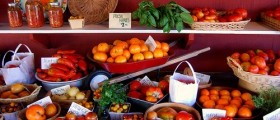
This article was triggered by the fact that lot of companies today are receiving negative attention concerning a very important topic. Namely, they are frequently accused of creating products which are environment-hostile.
It appears as though (while designing their products) they are only concerned with a disturbingly narrow range of parameters to begin with; and that is: obtaining profit, and then some more profit.
But then there are those who stand out from the lot by creating organic products. One such company is GuideMeGreen, who support both making profit and keeping their products green and organic.
A few of the main properties of organic farming would include: the restriction of use of artificial chemical fertilizers and pesticides, the development of healthy and fertile soils which may be used to grow a mixture of crops, and lastly, the animals are reared minus the routine use of drugs, antibiotics and wormers (which are all common components of intensive livestock farming).
Additionally, ingredients such as Sudan1 which may cause cancer are absolutely not allowed under these organic standards.
Why should we buy organic?
Nowadays, every food category out there has got an organic alternative. It also appears to be good for everyone: the consumer, the environment and the small scale farmer's who grow it.
Atop of it all is also a lot more flavored, as opposed to the non-organic – thusly it even tastes much better. It is a healthier choice and is just as good for the larger community of which we are all a part of and does well for the ecological neighborhood.
The GuideMeGreen company helps people find locally produced foods which are a lot fresher, healthier and more economical than the imported ones. Thanks to this kind of attitude, the "go local" movements seems to be flourishing with over 15% of people buying organic food, and locally.
This rising figure has also proportionally increased (and resumes to increase) the number of local farmer's markets, box schemes, cafes and restaurants which serve organic food.
Not to mention that this movement also cuts down transport costs and "food miles", as it cuts down the cost of the average shopping basked which until recently had included a lot more foods from all around the world.
On the slightest of down sides, the supermarkets may find themselves subject to a number of more drastic business changes, since their customers will be exposed to the principles and practices which are different from what they were used to up until then – namely, those which inspire the original, local foods as well as the grassroot box-scheme movement.




_f_280x120.jpg)












Your thoughts on this
Loading...